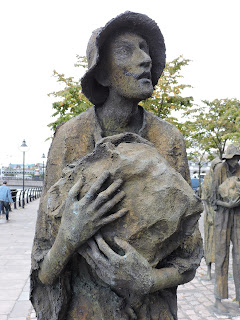Rough wood planks beneath my feet were rocking so much that I couldn’t regain my balance. I vomited into the bucket again.
“Where am I?” I
gasped.
“There, there,
Maggie,” came a gentle male voice. “They say the voyages to America aren’t
always this rough.”
“America?” I
murmured. “Why?” As I lifted my head away from the smell in the bucket, my nose
was assaulted by even worse scents—human waste and many unwashed bodies.
“Don’t you
remember?” the gentle voice said. “Ah—but perhaps it’s the Sea Fever. It makes
you forget, and some people lose their minds completely.”
I turned to look at
this man, as he patted my back. He must have seen the confusion on my face, for
he said, “I’m Thomas Cantlon, your husband. Do you remember me?”
Then my mind opened
like a door, letting in some light of understanding. “Of course I remember, you
oaf of a man.” O hoped this sounded enough like recognition. Just then, the
floor lurched again, and I fell into his arms.
“’Tis all right,
dear Maggie. You just need to rest. Our wee son Johnnie is asleep at last.”
Thomas led me to a
rough plank raised about three feet off the floor. It just over a foot wide,
and the length of a grown man. With his help, I climbed onto what must be my
bunk. A pile of soiled clothes was the only pillow and a ragged blanket lay
beneath on the plank.
On the small bunk
beneath me, I could hear a child’s deep breathing in sleep. I assumed this was
‘wee Johnnie’. After I was settled, Thomas climbed onto the plank that
stretched three feet above my head.
Where am I, Cinda?
‘You’re in an emigrant ship from Cork, bound for North America.
It’s the year 1847.’
But why?
‘Because of the famine.’
Famine? Are you talking about the Potato Famine?
‘Yes, but I think I made a mistake in bringing you to 1847. This
is in the middle of everything—the worst winter on record, and the largest
number of emigrations in a single year. I think I should have taken you back a
few more years to when it all started.’
I sighed, but I
couldn’t tell if it came from my real self or from Maggie—or both of us. Okay,
Cinda. Let’s get this over with. I hope it means I’ll get off this wretched
ship.
As Maggie fell into a fitful sleep. I felt myself—the Emilia part
of me—rise and disappear into those flashing amber lights.
Cinda’s voice
whirled into my mind in the same way as the colors, which were now changing to
a harsh vermillion. ‘Maggie Cantlon’ is your great-great-grandmother. Wee
Johnnie grows up in America and becomes just John. When he marries, he has a
daughter named Mary, your grandmother.
All right, I get that. Why wasn’t I
put into my great-grandfather John. He’s the one Grandma always talked about.
‘Two reasons: He
was born during the famine, and he was only a child of three when this ship
sailed. But we are here to learn history. You can’t go ‘within’ a person of the
opposite sex, though.’
I hadn’t thought of that. So are
you taking me farther back to when Maggie was younger, and to when the famine
started?
‘That’s the
plan.’
You’d better get it right this
time.
‘Don’t worry, I
will. This my first time being the guide instead of the one being guided.’
Wait! What?
No reply came. Her voice faded like a gull winging into a fog.
The
colors ebbed away, and next thing I knew, my bare feet stood on green grass. It
was day, but fog was drifting and curling around me. My eyes made out a small
stone cottage, roofed with thatch. The man who’d called himself Thomas was
gazing at me from the single doorway in the stones. He had to duck to come out,
for the door was only about five feet tall. He looked much younger, and his
brown eyes sparkled as he smiled at me.

No comments:
Post a Comment